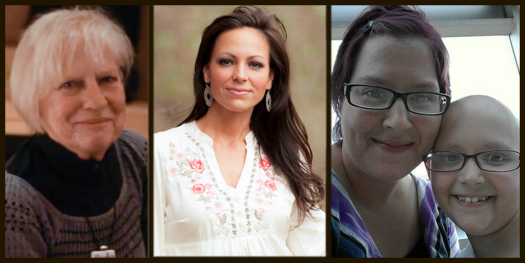 Some might call it a “miracle,” but alternative and holistic medicine healers aren’t really surprised to learn that a 12-year old Amish girl is now cancer-free — after her doctors testified in court just six months ago that she would be dead by now if her family were permitted to refuse her chemotherapy.
Some might call it a “miracle,” but alternative and holistic medicine healers aren’t really surprised to learn that a 12-year old Amish girl is now cancer-free — after her doctors testified in court just six months ago that she would be dead by now if her family were permitted to refuse her chemotherapy.
As reported by the Medina Gazette, of Medina County, Ohio, Maurice Thompson, head of the libertarian non-profit group 1852 Center for Constitutional Law, said young Sarah Hershberger now shows no signs of being stricken with cancer at all and appears to be healthy. Continue reading

 In 2013, the Swiss Medical Board, an independent health technology assessment initiative, was requested to prepare a review of mammography screening. The team of medical professionals included a medical ethicist, a clinical epidemiologist, a pharmacologist, an oncologic surgeon, a nurse scientist, a lawyer, and a health economist. Two of those members, Nikola Biller-Andorno, M.D. Ph. D. and Peter Juni, M.D, opened up about the project in the New England Journal of Medicine.
In 2013, the Swiss Medical Board, an independent health technology assessment initiative, was requested to prepare a review of mammography screening. The team of medical professionals included a medical ethicist, a clinical epidemiologist, a pharmacologist, an oncologic surgeon, a nurse scientist, a lawyer, and a health economist. Two of those members, Nikola Biller-Andorno, M.D. Ph. D. and Peter Juni, M.D, opened up about the project in the New England Journal of Medicine.
 Eating tree nuts, such as almonds, pecans, walnuts, hazelnuts and cashews, may significantly reduce the risk of colon cancer recurrence, a recent study showed. To carry out the study, a team of researchers examined more than 800 patients with stage-III colon cancer. Data from an observational study revealed that patients who ate two ounces or more of all types of nuts on a weekly basis were 42 percent less likely to suffer a colon cancer recurrence than those who did not eat tree nuts. The researchers also found that patients who consumed nuts had a 57 percent lower odds of dying from colon cancer compared with the non-consuming group.
Eating tree nuts, such as almonds, pecans, walnuts, hazelnuts and cashews, may significantly reduce the risk of colon cancer recurrence, a recent study showed. To carry out the study, a team of researchers examined more than 800 patients with stage-III colon cancer. Data from an observational study revealed that patients who ate two ounces or more of all types of nuts on a weekly basis were 42 percent less likely to suffer a colon cancer recurrence than those who did not eat tree nuts. The researchers also found that patients who consumed nuts had a 57 percent lower odds of dying from colon cancer compared with the non-consuming group. 
 Many people who are reading this may have a high acidity level in his or her body. This is due to the typical first world diet of processed foods, refined sugars, and GMOs. However, many people do not know that an acidic body is a breeding ground for cancer, excess weight, pain and many health issues.
Many people who are reading this may have a high acidity level in his or her body. This is due to the typical first world diet of processed foods, refined sugars, and GMOs. However, many people do not know that an acidic body is a breeding ground for cancer, excess weight, pain and many health issues. Did you know that there are bacterium living in literally every part of our body? The fact is that there are more bacterial cells in the human body than there are purely human cells!
Did you know that there are bacterium living in literally every part of our body? The fact is that there are more bacterial cells in the human body than there are purely human cells!
 I have written a lot about vitamin D over the years — and there is a very good reason for this. If there is one supplement that would be at the very top of my list for helping prevent and supporting the healing of Breast Cancer, it would be vitamin D!
I have written a lot about vitamin D over the years — and there is a very good reason for this. If there is one supplement that would be at the very top of my list for helping prevent and supporting the healing of Breast Cancer, it would be vitamin D! I try to mostly write stories that are positive and filled with hope. Not because I don’t have times of deep pain and loss, but because it’s where I try to stay in my thoughts and in my heart… even when it’s not easy. That being said, sometimes it’s hard to find the positive in a story…
I try to mostly write stories that are positive and filled with hope. Not because I don’t have times of deep pain and loss, but because it’s where I try to stay in my thoughts and in my heart… even when it’s not easy. That being said, sometimes it’s hard to find the positive in a story…  Besides being a substance that is almost impossible to pronounce, Methylsulfonylmethane (abbreviated to MSM) is often misunderstood in terms of how it specifically can help the body. It is becoming clear, however, that sulfur supplementation is a necessity in our increasingly toxic world. In addition, current research is discovering the role MSM can play in preventing cancer and even shrinking tumors.
Besides being a substance that is almost impossible to pronounce, Methylsulfonylmethane (abbreviated to MSM) is often misunderstood in terms of how it specifically can help the body. It is becoming clear, however, that sulfur supplementation is a necessity in our increasingly toxic world. In addition, current research is discovering the role MSM can play in preventing cancer and even shrinking tumors.  Dr. Sherrill Sellman’s book, “What Women Must Know To Protect Their Daughters From Breast Cancer“, says, “Breast cancer will always be a tragedy that befalls a woman. It tears at the very fabric of a woman’s life rippling out to touch all those in her word. The fears, uncertainties, and pain are deeply and profoundly shared by family, friends and co-workers. It is even a greater tragedy when young women are faced with this crisis because the tumors tend to be more aggressive. Young women also have to face the grim reality of a more advanced cancer at the time of diagnosis and higher mortality rates. Not one of them ever suspected, at their age, they would be become a breast cancer statistic. A breast cancer diagnosis always comes as a shock; no one ever expects it, especially young, vibrant and seemingly healthy women.”
Dr. Sherrill Sellman’s book, “What Women Must Know To Protect Their Daughters From Breast Cancer“, says, “Breast cancer will always be a tragedy that befalls a woman. It tears at the very fabric of a woman’s life rippling out to touch all those in her word. The fears, uncertainties, and pain are deeply and profoundly shared by family, friends and co-workers. It is even a greater tragedy when young women are faced with this crisis because the tumors tend to be more aggressive. Young women also have to face the grim reality of a more advanced cancer at the time of diagnosis and higher mortality rates. Not one of them ever suspected, at their age, they would be become a breast cancer statistic. A breast cancer diagnosis always comes as a shock; no one ever expects it, especially young, vibrant and seemingly healthy women.”  Half of all men and one-third of all women will experience cancer at some point in their lives. Fortunately, there are ways to significantly reduce your risk, as detailed in Dr. Leigh Erin Connealy’s book, “
Half of all men and one-third of all women will experience cancer at some point in their lives. Fortunately, there are ways to significantly reduce your risk, as detailed in Dr. Leigh Erin Connealy’s book, “